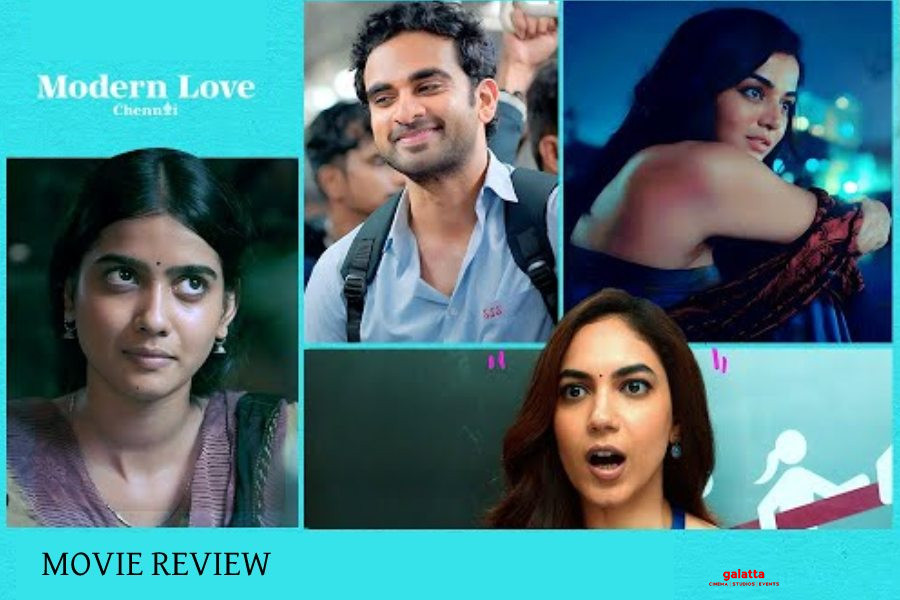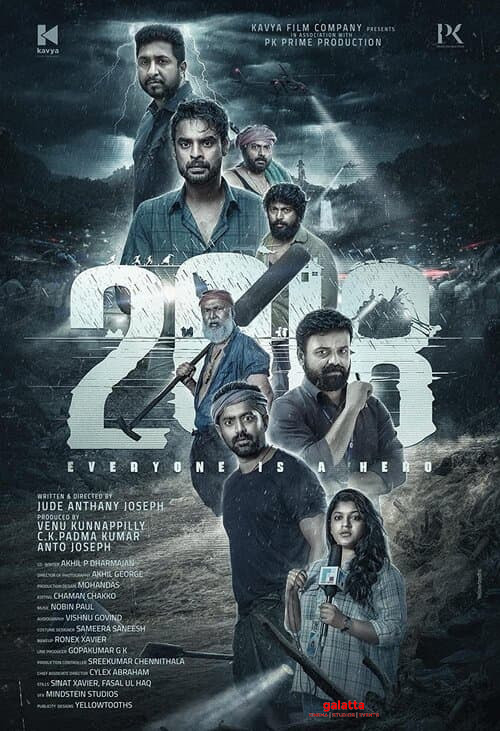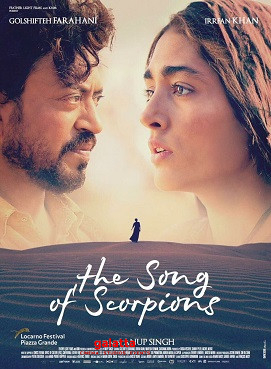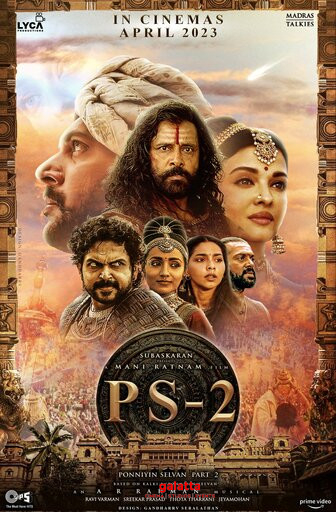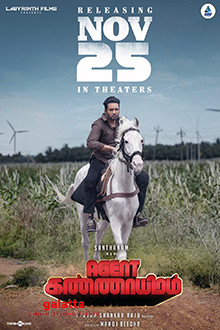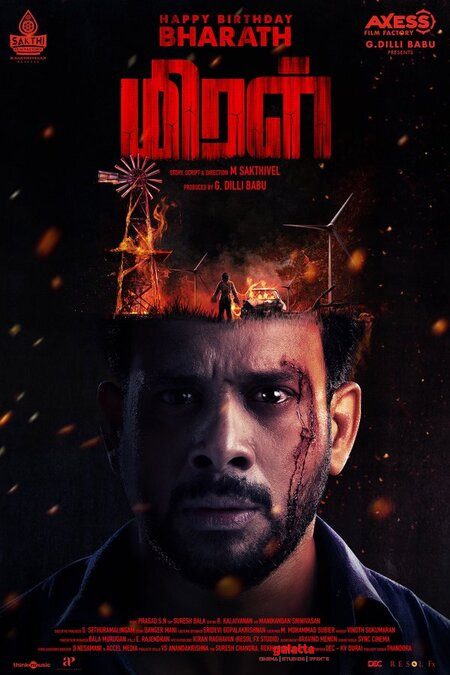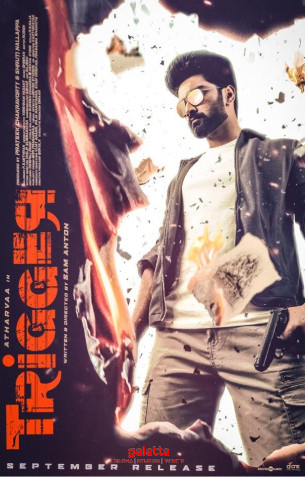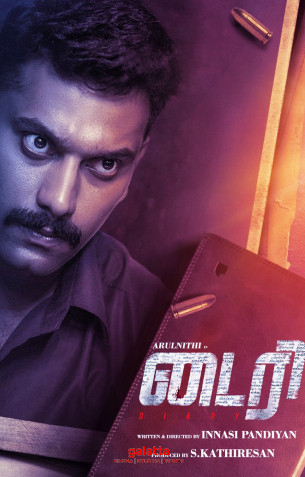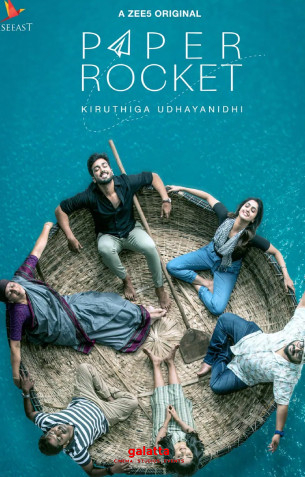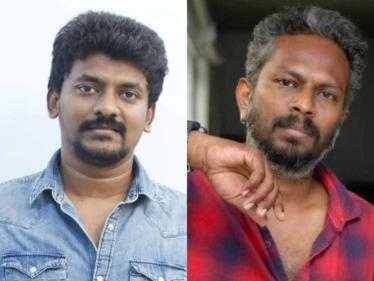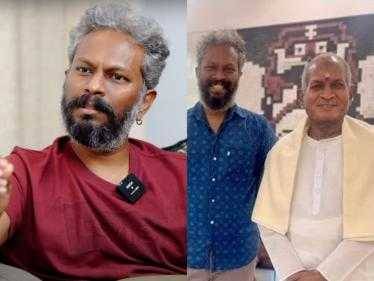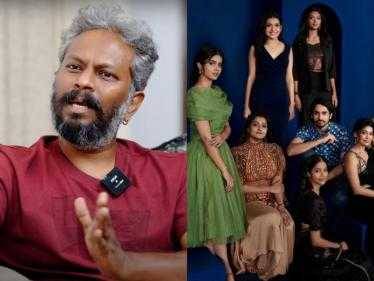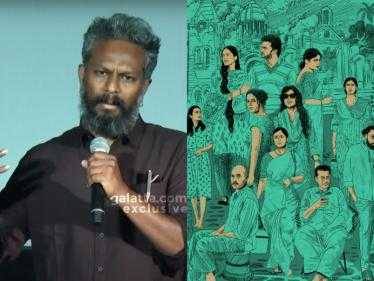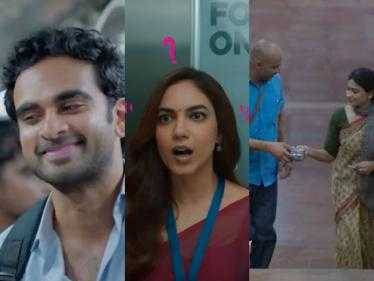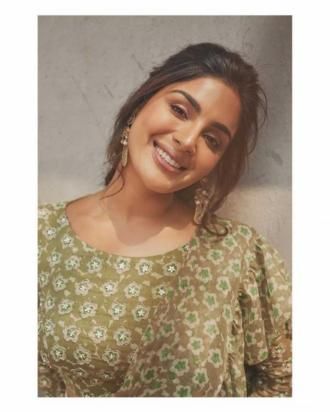Modern Love Chennai Movie Cast & Crew
Modern Love Chennai is easily the best thing to come out of the Tamil OTT space. This is not to say that I liked every single short in this six-episode anthology equally, and I will talk more about that later. This is about the fact that – for the first time since the anthology wave hit us – you sense a unifying aesthetic running through every single short film. Yes, every episode is adapted from the "Modern Love" series in the New York Times – but it's not just that. It's also the fact that all episodes are strongly centred on women. It's also the creative vision and the low-light cinematography across the stories, and the presence of rain (like a repeating "guest role") and the colour palette, with a shade of green that's seen on a wall in one episode and on a young girl's bicycle in another episode. You can see how creative producer Thiagarajan Kumararaja and his core team have pushed every single contributor: even with different directors with differing sensibilities, there's shared DNA right through.
There's also a lot of Ilaiyaraaja love, from the hat-tip to songs like Uravugal thodarkathai, Engengo sellum en ennangal, En iniya pon nilave, Ninaivo oru paravai… to his own new compositions and background scores for this anthology. But let's get to that later. For the first time in an anthology, you feel that even the episode order makes sense. Usually, you could pick any of the six films and watch it first – but here, there's a progression of moods. We start with a simple, affecting drama: Rajumurugan's Lalagunda Bommaigal. In Episode 3, we pause for some lightheartedness in Krishnakumar Ramakumar’s Kaadhal Enbadhu Kannula Heart Irukkura Emoji. This acts as a palate cleanser, because the next three episodes are deep dramas, concluding with the emotionally and structurally dense Ninaivo Oru Paravai, by Thiagarajan Kumararaja. And for the first time, you see someone taking full advantage of the freedoms offered by the OTT space. When you know you don't have to cater to "all audiences", you can make exactly the films you want, with exactly the themes you want.
Every film has something (or things) going for it, but the standouts are the episodes by Krishnakumar Ramakumar, Akshay Sundher (Margazhi), and Thiagarajan Kumararaja. In their films, love is a filmy fairy tale, or a ray of sunshine in a dark phase of life, or a puzzle to be put together over time. Each of these episodes has a strong director's voice. The other directors are Rajumurugan, Balaji Sakthivel (Imaigal) and Bharathiraja, whose film, Paravai Kootil Vaazhum Maangal, is a truly unique beast. If it doesn't have the director Bharathiraja's voice, it's because… Anyway, we'll talk more about each film in depth (and with spoilers) in the individual reviews. But for now, this is the OTT breakthrough we have been waiting for in Tamil. These are not the kind of films you watch at home because "there are no stars" or "there is no scale" or some such thing. You'll watch it at home because films like these cannot be made to be screened in theatres for a larger mainstream public. Love, here, is not just a beautiful red rose. It's also a cactus with thorns.
LALAGUNDA BOMMAIGAL
Is modern love just attraction, followed by abortion? This is not the central thesis of writer-director Rajumurugan's film, but there's a thought there. At a time when getting physical is so easy, where does "love" kick in? The beauty of this episode is that it operates on two levels. The first is the obvious surface-story of Shoba (Sri Gouri Priya) learning to cope with a failed affair. As someone says, maybe the pain caused by broken love can only be healed by finding another person to love. The second layer is more fascinating: it's about not judging a book by its cover. Someone who appears to be a crook at the beginning ends up a sweetheart. Someone who appears to be a sweetheart at the beginning ends up a crook.
For the first time since parts of Joker, you feel the talented Raju Murugan is a director – and not just a well-intentioned writer/storyteller. There's an attention-calling shot where Viji (Vasundhara) gets up from a waiting area and enters a doctor's room. The situation involves an abortion. A little later, the same situation arises – we get the same shot, from the waiting area to the doctor's room. The repetition of events is mirrored by the repetition of the camera movement. Nirav Shah is the cinematographer and he gives us image after wondrous image. My favourite frame is possibly that of a sweaty man standing inside a bakery, with a naked yellow bulb behind him casting just the right kind of fluorescence. It's like a little sun at the centre of the frame: we feel the heat.
The gentle-faced Vasudevan Murali plays a pani puri seller named Nathuram. He nails the shy character, just like Sri Gouri Priya nails the hardness, the anger in Shoba – despite a tendency to gesticulate a lot. R Prasanna Ramkumar is hilarious as a godman who gets an ending you won't believe. But the best performance is delivered by Vasundhara, who is this story's voice of reason. She bears scars on her body, self-inflicted as well as the ones given by life. Which woman does not have pain in her heart and marks on the body to match, she asks! At the same time, she acknowledges that you can't live with men, and you can't live without them.
The one issue I had with this film – as with a couple of others – is that it feels a tad stretched. But that allows for Sean Roldan's songs to find a place. Uravu is especially gorgeous, and its opening lines ("oru murai dhan mazhai varuma…") contains the ache the rest of the film doesn't. By burying the emotions in the song, the narrative is free to be utterly unsentimental. Even the background score – like in quite a few episodes – is very minimal. What about the double-twist at the end? It works very well, and we see Shoba's anger finally evaporate and turn into the biggest, teeth-exposing grin she has given this far. So has she finally found love? Or like the heroine of Episode 3, has she been surprised that an arranged marriage - of all things - has restored her faith in love? Sometimes, perhaps, the old traditions result in modern love.
IMAIGAL
One of the pleasures of this anthology is the number of female actors who give such strong performances – like TJ Bhanu (also credited as Parvati Murty) in this episode, Imaigal, written by Balaji Tharaneetharan and directed by Balaji Sakthivel. The character she plays is named Devi, and she has an eye condition that results in a lot of situations that might sound melodramatic if someone described them to you. But Bhanu defuses all the melodrama with one of the most honest and minimalistic performances I have seen in a while. See, for instance, the small look of humiliation on her face when the school-bus driver yells at her. There are no big gestures and yet, she makes us feel the big emotions churning inside her character. One of the most touching moments is when she sets off to a wedding reception with her husband, Nithya (Ashok Selvan). They have a fight and he wants to go home and attend the marriage the next morning, but she says that that would mean she has to dress up all over again.
One of the great things about art is that it gives us a glimpse into micro-matters that we might not be conscious of. What a trivial thing this seems to be: all Devi has to do is wake up the next morning, wear a nice sari, put on some makeup and be ready. But her eye problem makes this molehill a mountain, and through this "small issue", we sense how difficult life must be for her. Yuvan Shankar Raja keeps the background score to a minimum, almost like ambient music that bubbles up every now and then. (He also composed the theme song for the anthology.) The progression of the story is very conventional (not in a bad way): the start of the relationship, the introduction of the problem, the troubles, and the affirmation that love can triumph over anything, everything.
But the writing is so sharp and nuanced that, despite so much material for a sob story, we never get into mega-serial territory. What is so "modern" about this love? Instead of answering that question, let's look at the modern way love is depicted in the scene where Nithya has a fever and calls Devi home from the Aavin outlet she works in. (All stories have these little - or big - Chennai landmarks.) The fact that she agrees to come home seems to make him better. He kisses her baby bump. She doesn't melt. She's just… happy. These "nothing" moments add so much to the feel of the film. We will get more "nothing" moments from this writer in Episode 4, but for now, I'll just leave you with the image of Devi playing the veena and finding immense joy. This is another kind of love, something you find not with others but within yourself.
KAADHAL ENBADHU KANNULA HEART IRUKKARA EMOJI
I’ll begin with a disclaimer, or for some of you, it may be a warning: I play a small role in this film. Now that that’s out of the way, let’s get to Krishnakumar Ramakumar's Kaadhal Enbadhu Kannula Heart Irukkara Emoji. In the midst of five dramatic films, this episode, written by Reshma Ghatala, is a frothy delight. It’s the one that makes you go awww at the sight of matching wet footprints. Ritu Varma is superb as Mallika, a self-confessed “cinema paithiyam”. She’s especially mad about romantic movies, and she loves dancing in the rain. (A snobby, Godard-quoting film critic tries to make her see reality, but to no avail.) After a relationship goes bad, Mallika makes a very astute and hilarious observation. She draws attention to the fact that there are so many breakup songs for men (like ‘Anjala’ in Vaaranam Aayiram) but none for women.
Mallika wants a man right out of the movies, but things keep tripping up and real life keeps intruding – like in the scene with the man who makes her skin crawl the way Mohan made Revathy’s skin crawl in Mouna Raagam. (As you may expect, this episode is filled with movie references, including a certain Mechanical Engineer at a college festival.) Despite Mallika’s “tragedies”, this film is very light on its feet, and it has been directed with bubblegummy pop-energy. You may laugh out loud at exaggerated scenes like the one where a self-imposed exile is ended with “mangalagaramaana” (auspicious) music from the movies. This is the one film where I wanted a full-on song. GV Prakash’s ‘Kukunnu’ is a bouncy tune, and I wish it had been used in its entirety. Interlinking alert: whether intentionally or not, this number is sung by Ramya Nambeesan, who… plays a part in Episode 5.
Like I mentioned in another episode’s review, rain is a constant throughout the anthology. Several crucial moments in Mallika’s life – happy and sad – play out in a downpour, especially at the bliss-out of an end, where we meet a perfectly cast Vaibhav. Wishes do come true – and sometimes, when we have all but given up. You want Mallika’s love life to have a happy ending, but you also want her to keep failing so that we see what over-the-top reactions she will have – like locking herself up in her room, like a certain Neelambari. The silliness is intentional, and it's contagious. I laughed out loud when a character said he likes ‘mutta puffs’, which is the name of a character in Super Deluxe. Maybe, under the radar, Thiagarajan Kumararaja is creating his own universe: TKU.
MARGAZHI
After Episode 2, Balaji Tharaneetharan writes an even better screenplay for Margazhi, directed by Akshay Sundher. We have heard of boys talking about female body parts, but how often do we hear schoolgirls talk frankly about sex? This happens between Jasmine and her friends, and like everything else in this superb short, it doesn’t exist to Make A Point. It just is. All episodes in this anthology carry flavours of Chennai, and here we have the Madras-Christian flavour. Jasmine’s parents have just been separated, and her father – a music teacher – tries to engage her with catechism class and the church choir. There, Jasmine meets the new boy, played by Chu Khoy Sheng. Is it love? Sanjula Sarathi has an exquisitely delicate face and delivers a performance to match. It’s not easy to read her, but we sense her hesitation in the way she says “okay” when he asks her out.
Akshay Sundher has also done the editing, and sometimes, the cuts come in disorienting bursts – like the way the Ilaiyaraaja song Jasmine keeps listening to keeps getting cut off. The effect is lovely. By the way, what is that song? Is it something her mother or father loved? Does it take her back to another, happier time? Or does she just love Ilaiyaraaja’s music, given how she can play an Aval Appadithan song on the piano, just like that. As Jasmine plays the gorgeous song, there’s a cutaway to the boy’s grandmother. Both are framed by a gently fluttering curtain. Ilaiyaraaja paints Jasmine’s regular days with a gentle guitar-flute theme, and we feel her existence change – a burst of life – when the song Nenjil oru minnal appears. Slice-of-life is one of the most difficult things to capture on screen, and this episode does that beautifully.
Everything in Margazhi is so delicate, like the pastel pink sky from Vikas Vasudevan’s camera. Even the definition of love – or, at least, what we come to understand of it – is so delicate. In the movies, breakups or partings are causes of great sorrow, but what if a certain kind of love is meant to be temporary? What if, given this film’s setting, it is a gift from God to help you out of a difficult situation? What if love is simply a ray of sunshine meant to dispel the darkness in your life, and nothing more? The last scene is a killer, and the small pool of tears in Jasmine’s eyes make us see what this moment means to her. I kept thinking about that look for a long time. The after-effect of this film is like a fragrance. It lingers.
PARAVAI KOOTIL VAAZHUM MAANGAL
Paravai Kootil Vaazhum Maangal, written by Pratheep Kumar S, rests on a unique concept of one filmmaker mimicking another. The director is Bharathiraja, but the muse is Balu Mahendra. An early scene is set to a song from Moodupani. The story of a married man falling for another woman is a variation of Marupadiyum, and the central characters played by Kishore, Vijayalakshmi and Ramya Nambeesan carry the same names as the central actors of that older love triangle: Ravi, Revathi and Rohini. Vijayalakshmi – who is very good – even looks like Balu Mahendra's muse Mounika at times. And the dialogues have the pause-inflected rhythms from Balu Mahendra's films. Even the style is the "invisible" Balu Mahendra style, with nothing showy. Jeeva Sankar's cinematography, Ilaiyaraaja's small stretch of music – both are minimalistic. Even the colours of the clothes blend with the wall so that nothing stands out – rather, sticks out.
The way Ravi and Rohini fall in love is fantastic. It begins with a small confusion, and then, almost wordlessly, we see the blossoming of a relationship. A more conventional film would feel the need to address the "why" question: Why does this married man fall for this woman? But sometimes, the "why" is just that we change over time, and love changes over time, and the person we were in love with at one point may no longer be the one that "fits" us. This is a very common thought in Western nations, but in this Chennai context, it feels refreshing and revolutionary. What's even more refreshing is that all three parties – all three vertices of this triangle – understand this. This is a truly modern love story, which says that we should listen to what our heart says, no matter what our age.
"Neenga oru mudivu edutha seriya thaan irukkum", Rohini tells Ravi, that she trusts his judgement. It's brilliant. After all, he is the one who has the most to lose, and he has to make the right choice – a choice that is "right" for everyone, including him. Just because he has kids, should he forget or forgo what he wants, what he needs? And isn't a broken home better than one filled with compromises and the ensuing resentments? I loved the writing touch that Revathi knows about Rohini's past before we do. Revathi's small home is her world, the one she shares with Ravi. Rohini's world is small too – it's the size of the metro-rail compartment that she shares with Ravi during their travels. A society-shattering dilemma is kept small, contained in small spaces.
That's why the film begins to falter when "society" begins to peep in and pass comments and judgments. Many intimate films do not need supporting characters. Ravi's father and the man in an elevator could have been cut out completely. We already know what they stand for, because we already know the society at large. These reminders of conventional "right" and "wrong" are not needed. The other issue with the film is that it is too talky, and not in a good way. Almost everything is spelled out – say, in the way Revathi handles her father-in-law and her children over the phone. The point is that she knows how to keep this family unit going – and it is brought out too emphatically. There's also the occasional problem of the "meaningful" dialogue – like at the point where the impossibly Zen-minded Revathi tells Rohini that the small kitchen cannot hold both of them. All of this is old-fashioned.
But perhaps intentionally so. The last shot is a beauty. It flickers between the present and the past, between a beginning and an end. As though looking through an invisible mirror, Revathi seems to be looking at herself. There's a smile. Is she happy? Or is she just smiling at how things have turned out? This is the directorial flavour I yearned for, but then I also get that this is a film that is deliberately done in this particular way. And despite the (deliberate) old-style contrivances, modernity wins. The writing avoids melodrama. It avoids guilt. It avoids shaming "the other woman". It avoids soul-searching, all that "Are we doing the right thing?" bullshit. These people are truly modern – and the film makes a gentle case that you cannot break something that is already broken. It says that you do not become a bad person because you go after what you want. That deserves a small modern-heart emoji.
NINAIVO ORU PARAVAI
Let’s take a leaf out of Fellini and refer to Ninaivo Oru Paravai as Thiagarajan Kumararaja’s 2-½th film. There’s quite a bit of lovemaking here, but the person who’s most naked is the director himself. This may be as close to an autobiography (again, 8-½ alert!) a filmmaker has made. Take the lead character of K (played by pb) – that’s possibly K for Kumararaja. Like Kumararaja, K is a filmmaker who’s an Ilaiyaraaja fan. The woman in K’s life is Sam – maybe she’s Samantha, who was in Kumararaja’s movie. And so forth. For cinephiles, Ninaivo Oru Paravai is a start-to-stop wank-fest – and not just because every deeply saturated, orgasm-inducing frame by Nirav Shah and Jeeva Sankar (and the colorist G Balaji) makes you want to keep staring at it with a combination of film appreciation and lust. The sharp cuts to colours – say, the neon-yellow of a corridor to the whites of a hospital room – are their own little movie.
But here’s the other thing that makes this film special: there’s the nonlinear blurring between cinema and memory and life. You end up asking questions like: As with K, how much of my life is my own, and how much is shaped by the movies? What is real, and what isn’t? Like the title suggests, this is a memory-movie: K becomes a sort of amnesiac, and Sam has to help him fill in the gaps in his knowledge. But are they real people or are they characters in K’s screenplay? (The film begins with a breakup, but then, K’s script, too, begins with a breakup.) Ninaivo Oru Paravai is like a Rubik’s Cube. Every bit of memory is a little coloured square, and with each turn of the screenplay, we reach a new combination of events that make us wonder if this, finally, is the “truth”. Or is Sam feeding memories to K based on his own screenplay, which she has stolen from him? Like a fortune teller says, “Ivanga kathai oru periya puthir-u”. (Their story is a big puzzle.)
Before we get any further, let’s talk about the way Thiagarajan Kumararaja and Ilaiyaraaja redefine the concept of background music. From the beginning of cinema, background music has been used to heighten an emotion or a situation: for instance, someone is sad, so let’s play a solo violin. There are exceptions in avant garde cinema, of course, but I am talking about the mainstream. Another use of background music has been to define characters or relationships through a theme. Ilaiyaraaja tosses all this conventional thinking out of the window and does something utterly radical. For instance, there is one breathtaking stretch of score that begins with techno beats at a disco and ends up as something grandly symphonic, sounding like Grieg’s In the Hall of the Mountain King. The music, in other words, works like the corridor Sam is often seen in. It is a passage, a link between two different locations or moods. It works brilliantly.
Like in the other episodes, the fantastic jazz-rock music does not play over the dialogue – to a large extent. A song starts – but when K and Sam fight, it stops abruptly. The piecemeal approach to the score/songs is completely in sync with a screenplay that is all about pieces of memory being put together. With the exception of a violin piece that plays when Sam reads a note from K, there’s no other stretch where music is used for underlining a single emotion or state of mind. We hear music only when Sam is on screen (with or without others). Early on, in her house, we see a gramophone player with an LP playing. Is Ilaiyaraaja’s music coming from the LP, as a pre-recorded piece that already exists within the movie, or is the music playing over the image of the LP, the way regular background music does, outside the world of the movie? More fun!
Both pb and Wamiqa Gabi are fantastic – they try to find a semblance of inner life in these “puppets” created by their director to make his points. At one point, Sam observes people and says human beings are interesting creatures. She’s studying them like a scientist studying an insect under a microscope, and that’s exactly what Kumararaja does in his movies. (That’s also what makes his films a somewhat “cold” experience to those who just want a story to unfold.) He creates these wonderfully strange characters and uses his screenplay as a microscope to scrutinise their oddities and behaviours. I also think this director is really into sci-fi. Like the alien in Super Deluxe, we get a glimpse of what could be a UFO here. And there is this fantastic conceit that involves Thursday and memory implants that, when extrapolated, is a reflection on the ellipses in art, where everything is not explained.
More than anything, I got the feeling Kumararaja puts himself under the microscope – revealing to us things that may or may not be his real self. I know that the Dali statuette is from his life (there’s a Dali painting in his office), and I also know that he is as much a “Peter” as he is a thara local. (Note the line, “Proof pudding-la irukku.”) He is also completely irreverent. The scene where Sam transforms a part of a mother-son kural to a sexual situation is pure TK. But what about the political stance about the Prime Minister’s name? Let’s add that to the Rubik’s Cube and keep turning it. But bless his heart, he is not a naturalistic filmmaker. He has no desire to be “real”. He creates these wild fevered worlds where the colours explode and the light falls just so at Sam’s feet and a right-to-left camera movement is complemented by a left-to-right camera movement that feels like a dance. At one point, we hear these words: “If we lose our innocence, we are no longer artists.” Thiagarajan Kumararaja, may you never lose your innocence.
